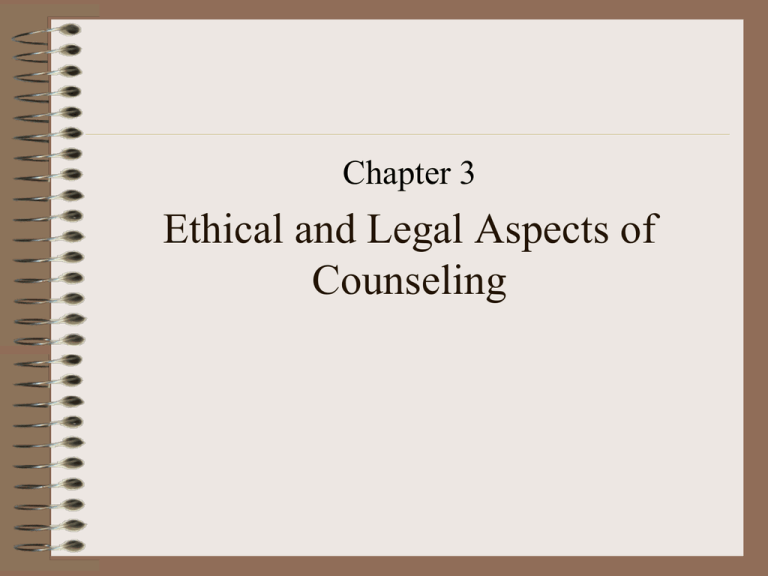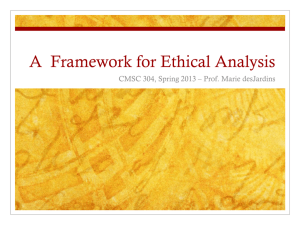Ethical and Legal Aspects of Counseling
advertisement

Chapter 3 Ethical and Legal Aspects of Counseling Ethical or Unethical • 1.) You are a successful counselor. One of your clients tells you that you have been very, very helpful to him, and in order to show his appreciation to you, he gives you a $10,000 diamond ring as a gift. You accept the ring. • 2.) A client cannot afford to pay for one of her counseling sessions with you. In lieu of payment, you ask her to babysit your 2-year-old son at your home a few times. • 3.) One of your clients feels sexually attracted to you, and tells you this. Immediately following the termination of counseling, you and the client mutually agree to start a dating relationship. Ethical or Unethical • 4.) You and your friends have a dinner at your home. One of your friends tells you that he is emotionally disturbed by some conflict in his marriage. You take your friend into the next room and provide him with a brief counseling session there. • 5.) You go to lunch with another counselor. In the restaurant, you each talk about some of your cases to learn from each other. Neither of you mentions the names of any of your clients. Definitions • Ethics – “Making decisions of a moral nature about people and their interactions with society” – “A philosophical discipline that is concerned with human conduct and moral decision making” – Professional behavior • Morality – “Judgment or evaluation of action” – Right and wrong behavior • Law – “The precise codification of governing standards that are established to ensure legal and moral justice” – Government behavior Common Unethical Behaviors of Counselors • Violation of confidentiality • Exceeding one’s level of professional competence • Negligent practice • Claiming expertise one does not possess • Imposing one’s values on a client Common Unethical Behaviors of Counselors • • • • Creating dependency in a client Sexual activity with a client Dual relationships Questionable financial arrangements (i.e., charging excessive fees) • Improper advertising Professional Codes of Ethics and Standards Why should counseling professionals abide by ethical codes and standards? • Good for clients? • Good for counselors? Reasons to Abide by Ethical Codes • To protect client’s rights while identifying expectations of practitioners. • To professionalize organization. • To allow a profession to regulate itself and function autonomously. Reasons to Abide by Ethical Codes • To control internal disagreements and thus promote stability of a profession. • To protect practitioners from the public (i.e., malpractice lawsuits). • To promote public trust toward the profession. ACA Code of Ethics and Standards of Practice (ACA, 1995) • • • • • Section 1: The Counseling Relationship Section 2: Confidentiality Section 3: Professional Responsibility Section 4: Relationships with Other Professionals Section 5: Evaluation, Assessment, and interpretation • Section 6: Teaching, Training, and Supervision • Section 7: Research and Publications • Section 8: Resolving Ethical Issues Limitations of Ethical Codes • Do not address every possible situation • Conflicts within ethical codes • Applicability of the code in today’s society? • Insensitivity to cultural diversity • Some conflicts between ethical and legal codes Making Ethical Decisions Ethical Principles: • Beneficence • Nonmaleficence • Autonomy • Justice • Fidelity Other Guidelines for Acting Ethically • • • • Act with personal and professional honesty Act in the best interest of clients Act without malice or personal gain Justify an action “as the best judgment of what should be done based upon the current state of the profession” (Swanson, 1983, p. 59) Ethical Decision-Making Models • Pgs. 66-67 Use Corey, Corey, & Callanan’s model to solve the problem • • • • • • • • 1. Identify the problem 2. Identify potential issues involved 3. Review relevant ethical guidelines 4. Review law 5. Obtain consultation 6. Consider possible course of action 7. Enumerate consequences of various decisions 8. Decide on best course of action • Case study: A client with a previous history of child abuse reported that she recently went through a great deal of stress from work. She revealed that she felt she was losing control and got angry easily with her 10 year old daughter at home. She indicated that on those occasions, she was on the verge of exploding on her daughter. • Case Study: An elderly male client with a history of chronic pain reports feeling down and no friends or family to talk to. He discussed feeling as though life isn’t worth living with his constant pain and that no one would miss him anyway. He stated that he has a full bottle of prescription pain medication at home, which would be the easiest way to commit suicide. Dual Relationships • Having sexual or romantic relations with a client during therapy • Having sexual or romantic relations with a member of the client’s immediate family during therapy • Having sexual or romantic relations with a client or a member of the client’s immediate family after the termination of therapy • Buying goods or services from a client, or entering into a business agreement with a client (in addition to counseling) • Employing a client, or providing therapy to an employee • Providing therapy to a friend or relative • Going out to eat with a client after a session • Inviting clients to a personal party or social event • Providing counseling to a supervisee or student • Being a part of the same organization as a client, or going to the same church/temple Working with Counselors who may act unethically • Prevention: 1. Identify the problem 2. Apply ACA/APA ethical code to problem 3. Approach informally 3. File an ethical complaint The Law and Counseling • Iowa Law Review Note (1971) – Counselors are legally-recognized professionals • Weldon v. Virginia State Board of Psychologists Examiners (1974) – Counseling is a distinct profession from psychology • Tarasoff v. Board of Regents of the University of California (1976) – Counselors have a duty to warn if an identifiable person is in danger • Ramona trial (1993) – Counselors have a duty to care – a legal obligation not to act negligently • Jaffee v. Redmond (1996) – Communications between licensed psychotherapists and their clients are privileged and do not have to be disclosed in cases held in federal court Civil and Criminal Liability • Liability: 1. Civil liability “Acting wrongly toward another or…failing to act when there [is] a recognized duty to do so” person person 2. Criminal liability Acting “in a way the law does not allow” state person Civil and criminal liability • Negligence – the departure from acceptable professional standards • Malpractice – the harm to a client resulting from negligence The Law and Counseling • Confidentiality – is the ethical duty to fulfill a contract or promise to clients that the information revealed during therapy will be protected from unauthorized disclosure. • Privacy – is a legal concept that recognizes individuals’ rights to choose the time, circumstances, and extent to which they wish to share or withhold personal information. • Privileged communication – regulates privacy protection and confidentiality by protecting clients from having their confidential communications disclosed in court without permission. Exceptions to Confidentiality • • • • • • • • When a client is a danger to self or others In cases of child abuse or neglect When vulnerable adults are being abused When a client is considering committing a crime When a client has been a victim of a crime During court-ordered psychological evaluations For the purposes of involuntary hospitalization When a client raises the issue of mental condition in legal proceedings • In client-counselor disputes Tarasoff v. Board of Regents of the University of California (1976) Prosenjit Poddar Tatiana Tarasoff Tarasoff v. Board of Regents of the University of California (1976) • Prosenjit Poddar told the student health center that he wanted to kill Tatiana Tarasoff. The psychologist told the supervising psychiatrist, who told campus cops, who detained Poddar but then let him go. Poddar killed Tatiana two months later. Her parents sued for “failure to warn.” The Trial Court said that no such duty existed. The CA Supreme Court cited Simenson v. Swensen and ordered a trial. The case was heard twice: – Tarasoff I: “Privilege ends where public peril begins” – Tarasoff II: A therapist has an obligation to use reasonable care to protect potential victims Guidelines for Implementing Duty to Warn Requirements • • • • • • • • Get informed consent Plan ahead through consultation Develop contingency plans Obtain professional liability insurance Involve the client Obtain a detailed history Document in writing Implement procedures to warn Legal Issues involved when counseling minors • Parental consent • Limitation of confidentiality • Family Educational Rights and Privacy Act (FERPA) – Allows parents access to their children’s records – Allows children access to their own records Codes of Ethics • ACA Code of Ethics and Standards of Practice (1995) – http://www.counseling.org/Files/FD.ashx?guid=ab7c1 272-71c4-46cf-848c-f98489937dda • APA (2002) Ethical Principles of Psychologists and Code of Conduct – http://www.apa.org/ethics/code2002.pdf • ASCA (2004) Ethical Standards for School Counselors – http://www.schoolcounselor.org/files/ethical%20stand ards.pdf








